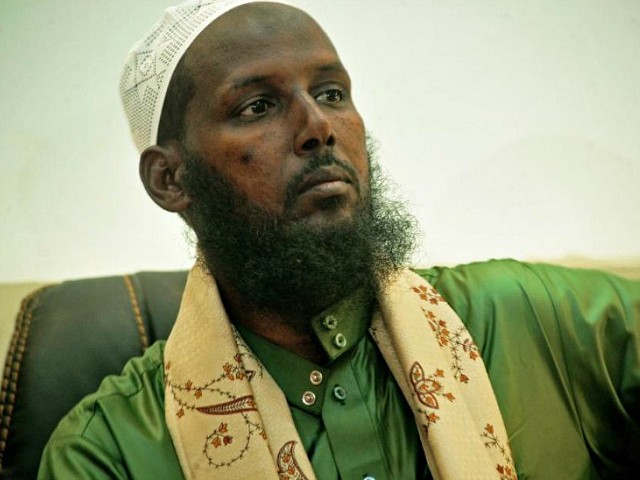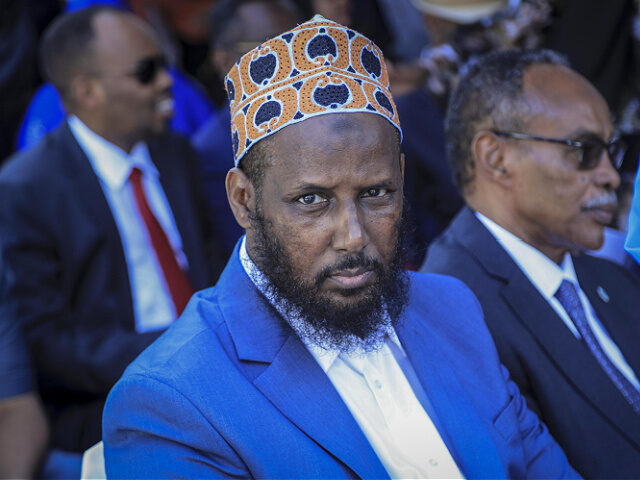Somali Prime Minister Hamza Abdi Barre appointed Mukhtar Robow — a former deputy chief of al-Shabaab, which is a Somali branch of the international jihadist terror organization al-Qaeda — as Somalia’s new religion minister on Tuesday, Reuters reported.
“After much deliberation with the president and the public, I have named cabinet ministers who have education and experience and they will fulfill their duties,” Prime Minister Barre said on August 2 before naming several cabinet appointees, including Robow. “I ask the parliament to approve the cabinet.”
The Somali parliament approved Barre as prime minister of Somalia on June 25 after he was nominated for the post by Somali President Hassan Sheikh Mohamud.
Robow, also known as Abu Mansour, was present in Somalia’s presidential palace on August 2 as Barre announced his new cabinet appointees before the press. Somali security authorities had released Robow just 24 hours earlier from detention at the headquarters of Somalia’s National Intelligence and Security Agency (NISA), Voice of America (VOA) reported on Tuesday.
Somali government authorities had subjected Robow to either detention or house arrest for the past few years. A joint unit of Somali and African Union security forces arrested Robow in Baidoa in December 2018 as he campaigned for a regional presidency in Somalia’s South West State. Somalia’s previous government ordered Robow’s detention in late 2018 to keep him from assuming power in the region, where he enjoys substantial public support as a native resident.
Robow’s December 2018 arrest provoked people in Baidoa to violently protest against the measure. Somali security forces responded to the rioting with a heavy hand. At least 15 people died during the clashes, “including soldiers and civilians,” the BBC reported at the time.

Former Deputy Leader and spokesman of Somalia’s al-Qaeda-affiliated Shabaab rebels, Sheikh Mukhtar Robow, also known as Abu Mansur, speaks to journalists on August 15, 2017, in Mogadishu. (MOHAMED ABDIWAHAB/AFP/Getty Images)
VOA recalled Robow’s dual history of serving both Somalia’s government and al-Shabaab on August 2, writing:
Robow rose to prominence as deputy defense chief of Somalia’s Islamic Courts Union in 2006, when the group temporarily seized control of most of southcentral Somalia, defeating a coalition of U.S.-backed warlords.
Robow went on to serve as al-Shabab’s official spokesperson and later as the group’s deputy leader. In 2008, the U.S. designated al-Shabab a terrorist organization. In 2012, the U.S. offered a $5 million reward for information leading to Robow’s capture, although that offer was withdrawn in June 2017.
“Before the creation of al-Shabab, Robow trained with al-Qaida in Afghanistan,” according to VOA.
Al-Shabaab formed in Somalia around 2006 as a direct offshoot of al-Qaeda, which is an international jihadist terror organization that was established around 1988. Al-Qaeda made headlines on August 1 when Washington announced that the group’s latest leader, Ayman al-Zawahiri, was killed by a U.S. military airstrike in Kabul, Afghanistan, on July 30.
VOA, a U.S. government-funded broadcaster, further revealed on Tuesday that an interview it conducted with Robow in October 2021 led to his latest detention by Somalia’s NISA, which ended on August 2.
“In August 2019 he was moved from prison to house arrest,” VOA noted, referring to Robow’s detention stemming from his December 2018 arrest in Baidoa.
“He was returned to NISA headquarters after giving an interview to VOA Somali in October of last year,” the broadcaster reported.
During the October 2021 interview in question, Robow alleged to VOA that he had been “abducted” by Somalian government forces, who, he claimed, were detaining him for political purposes because they did not want him to run for any government posts. Robow publicly denounced al-Shabaab in 2013 before first attempting to run for public office in Somalia in 2017.
Somalia’s newly-elected president, Hassan Sheikh Mohamud, assumed office in May. He campaigned on promises to crack down on al-Shabaab’s Islamic insurgency within Somalia. Al-Shabaab has reportedly grown stronger over the past three years, during which Mohamud’s predecessor, former Somali President Mohamed Abdullahi Mohamed was “consumed by political infighting, [and] took little action against al Shabaab,” Reuters recalled on Tuesday.
“That allowed the insurgents to build up substantial reserves of cash and carry out attacks over a wide swathe of Somalia. Last week scores of al Shabaab fighters and Ethiopian security forces were killed in clashes along the two nations’ shared border,” the news agency noted on August 2.

COMMENTS
Please let us know if you're having issues with commenting.